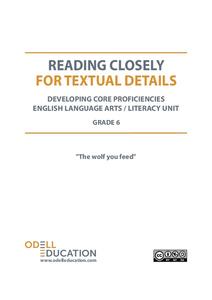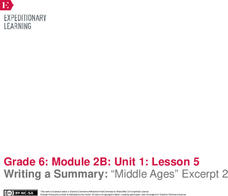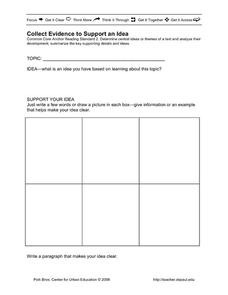Odell Education
Reading Closely for Textual Details: Grade 6
Close reading doesn't mean to literally read text close to your face, but rather to pay attention to particular details in order to develop a deep and purposeful understanding of text. The first part of a five-part resource provides an...
Fluence Learning
Writing About Informational Text: Music and the Brain
Even if you've never picked up a musical instrument, chances are that music has directly impacted your mental and emotional development. Sixth graders engage in a reading activity in which they read two articles on the impact of music on...
Curated OER
Writing a News Article
Join the newspaper business with a series of lessons and exercises focused on elements of journalism. The packet focuses on distinguishing fact from opinion, writing effective headlines, sequencing events, and editing and proofreading a...
Polk Bros Foundation
Show, Then Write What You Learn
After reading a text or covering a new topic, have class members fill out the four boxes on this page with facts. Individuals can use words or drawings to represent the facts.
University of Kansas
Newspaper in the Classroom
Newspapers aren't only for reading—they're for learning skills, too! A journalism unit provides three lessons each for primary, intermediate, and secondary grades. Lessons include objectives, materials, vocabulary, and procedure, and...
EngageNY
Writing a Summary: “Middle Ages” Excerpt 1
What's this all about? Scholars learn the importance of summarizing skills using a summary writing graphic organizer. They work with an elbow partner to discuss summaries and complete the organizer using Middle Ages Excerpt 1. Learners...
EngageNY
Drafting an Analytical Mini-Essay: Using Partner Talk and Graphic Organizers to Guide Thinking
Moving on up ... Scholars take a look at how the author of the model essay Elements of Mythology and Theme of Cronus moved up in the writing process from a graphic organizer to an essay. After walking through the writing process of the...
Polk Bros Foundation
How to Summarize an Event in History or Today - or a Story
Ask your class to write a quick summary of a historical or current event. The worksheet offers a place to note down important details about the event, such as time, place, people, how it started, and how it ended. Pupils then take this...
Polk Bros Foundation
How to Summarize a Non-Fiction Passage
After reading a text, one way to find out how much your class comprehended is to ask your pupils to summarize. This worksheet helps class members prepare for writing a summary of a nonfiction text. They note down the topic, up to eight...
Polk Bros Foundation
Common Core Constructed Response Organizer
Get your writers ready to compose a constructed response essay in response to either an informational or fictional text. Pupils note down the big idea they wish to address as well as up to nine examples from the text that they wish to...
Channel Islands Film
Santa Cruz Island - Writing for Information
After re-viewing a documentary segment on the restoration of Santa Cruz Island,, individuals craft an essay in which they compare the views of the various stake holders featured in the video and identify the point of view they find the...
EngageNY
Writing a Summary: “Middle Ages” Excerpt 2
What is the big idea? Scholars use Middle Ages Excerpt 2 to complete a summary graphic organizer. They then use the information from the organizer to write a summary of the text on lined paper. Learners share summaries with the class.
Have Fun Teaching
Identifying Author's Purpose
The multi-lesson, 47-page packet contains everything you need to ensure kids can recognize the clues provided to identify the type of text, the intended audience, and the author's purpose in writing the passage.
Polk Bros Foundation
I Can Comprehend a Paragraph, then a Page/Section in a Text
Help your class tackle chunks of text with a simple graphic organizer. Pupils read three paragraphs and, as they read, draw pictures in the provided boxes that demonstrate what each paragraph says. There are three boxes on the page and...
Do2Learn
Umbrella Organizer Frames
Being able to identify the details that support a main idea is an important skill. Have your pupils practice with this graphic organizer, which includes space for a main idea, three supporting details, and a final conclusion.
Polk Bros Foundation
I Can Identify a Nonfiction Writer's Main Idea and Supporting Examples
Use this page to quickly identify the central idea of a text and organize ideas for writing an informational or explanatory text. The worksheet is split into two parts. In the first part, pupils note down the main idea and supporting...
Polk Bros Foundation
Collect Evidence to Support an Idea
In order to support an idea, writers must use evidence. Your class members can prepare their evidence with this basic instructional activity. Writers note down the topic they are learning about and their own idea. Next, they come up with...
Polk Bros Foundation
Answer the BIG Question with Cited Examples and Evidence
Close up your unit of study with an examination of one of the guiding or essential questions as it relates to what your class has studied and other research. Class members first write down the question. Then they note down information...
Crafting Freedom
Creating Original Historical Fiction Using Henry "Box" Brown's Narrative and Runaway Slave Ads
Young historians discover the experiences of runaway slaves after reading the brief biography and narrative excerpt of Henry "Box" Brown, who escaped slavery by having himself shipped away in a crate and popularized his flight in a...
Curated OER
Is That a Fact?
Investigate popular scientific claims and gather evidence to defend or argue against an author's stance. Writers synthesize information and compose their own "Really?" columns modeled after those found in the weekly "Science Times"...
Curated OER
Family Life
What is family? Challenge your scholars to write an encompassing definition of what this word means to them. After reading "It May Be a Family Matter, But Just Try to Define Family," class members discuss the emotional issues surrounding...
Curated OER
Truth Be Told
Encourage your middle and high schoolers to share their memories of a recent event. After reading a New York Times article, they discuss Elie Wiesel's memoir, Night. They write their own memoir about a significant event that affected...
PBS
Writing a Historical Poem
Students conduct field research of a historical site in order to discover a more complete understanding of a time period. They choose one particular historical figure and write a short poem about the site from the historical person's...
Civil War Trust
Civil War Soldier: Experiencing the Battle of Franklin
Fighting a war over home soil makes a living nightmare even more real. Class members describe the experience of a Civil War soldier during the Battle of Franklin, poised right at a major turning point of the war, after researching the...

























